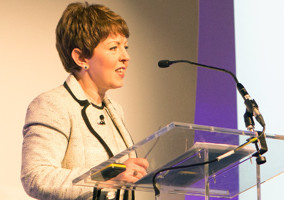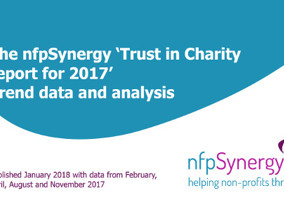Public trust and confidence in charities has “plateaued” at a level which is “unsatisfactory”, according to the Charity Commission’s latest research.
Trust in Charities, 2018: How the public views charities, what this means for the sector, and how trust can be restored, published today, finds that charities have a mean score of 5.5 out of 10 on trust.
This is 0.2 lower than two years ago when the Commission last did the research. The regulator says the drop is partly because of a slight change in methodology but that the figure is still too low.
Until 2016, trust had been rated consistently at around 6.7, but it dropped to 5.7 that year. This was blamed on scandals around fundraising and the collapse of Kids Company.
The latest research was conducted by Populus in February and is based on a sample of 2,059 adults.
It benchmarks trust in charities against other key professions, finding that charities are less trusted than doctors (7.4), the police (6.4) and the man/woman in the street (5.7), but more trusted than social services (5.3), private companies (5.0), banks (4.9), local councils (4.8), newspapers (3.9), government ministers (3.7) and MPs (3.6).
What drives trust?
This year the Commission asked questions to determine what factors are important in building trust.
People were asked to rank factors on a scale of 1 to 10. Charities being transparent about where money goes was rated at an average of 8.8, while being true to their values was rated 8.5.
Using resources efficiently was rated at 8.4 and being well-governed was rated 8.3.
Being entirely run by volunteers was rated at 6.0.
What knocks trust?
Some 45 per cent of respondents said that their trust in charities had decreased, just 5 per cent said it had increased and 48 per cent said it had stayed the same.
Of those who said it had decreased, 62 per cent said this was because of recent media stories and 60 per cent said it was because too much money is spent on advertising/wages/admin.
Just over 40 per cent of those whose trust had decreased said they donate less as a result.
The Commission carried out a controlled experiment which offered four different versions of a fundraising poster to see how people's trust and likelihood to donate was affected.
This found that including a pie chart to display how funds are spent was most successful, with 62 per cent saying they trusted it and 38 per cent saying they were likely to donate. This compares with 53 per cent trusting a version with an impact statement, and 49 per cent trusting a version with the regulator’s logo included.
Role of the regulator
Some 83 per cent of respondents said that they thought the regulator was “essential” or “very important”.
Over half, 55 per cent, said they think charities are regulated effectively, 33 per cent said they think charities are not regulated effectively and 13 per cent said they did not know.
The regulator asked people if they were happy for a “small fraction of your donation (less than 1p in £10) to paid to the Commission”.
Three-quarters said it would make no difference, 17 per cent said they would be more likely to give and 8 per cent said it would make them less likely to give.
‘Be more authentic’
The Commission has said it thinks the levels of trust are too low and said that charities need to be more “authentic” to rebuild trust.
“Public trust in charities has plateaued since 2016,” the Commission’s report said. “Whilst trust in other social institutions may have declined in comparison, we consider it unsatisfactory that charities are trusted less than the average man or woman in the street. It is our aspiration that charities are among the most trusted social institutions.”
Baroness Stowell, chair of the Commission, said: “What the public expect is not unreasonable: they want charities to be guided by their ethos and purpose in everything they do, and they want charities to use their money efficiently and responsibly.
“The public have seen evidence of charities failing to demonstrate these behaviours. So it is not surprising that trust has not recovered, and that the public are calling for greater transparency. This is proxy for a more profound issue: the public want evidence that charities are what they say they are.”
But she said this means that the answer lies in changing “attitude, ethos and culture”. She said that by ensuring that “everything charities do is driven by their purpose, we can reverse the decline in trust”.
The Commission is currently reviewing its strategy and Stowell said she wants to use the opportunity to work in “constructive partnership with charities to help us together respond to the public’s legitimate expectations”.
Sector reaction
NCVO: ‘Think of trust-building as a constant campaign’
Aidan Warner, senior external relations officer at NCVO said: “This research is an important temperature gauge for the sector, and it seems the attitude to charities is still chillier than we’d like. We need to think of trust-building as a constant campaign for everyone in the sector, the success of which will be driven in large part by every charity being seen to live its values. I hope the forthcoming NCVO sector code of ethics can be helpful here.
“The Commission has understandably said charities should focus on their behaviour rather than their communications, and that transparency alone is not enough, but the report itself does have some findings on how practical transparency helps to improve trust that could be useful reading for charity communicators.”
NPC: Charities should be required to report impact
Dan Corry, chief executive of charity sector think tank NPC, said: “We have long argued that there is a link between a charity's ability to both measure and illustrate it’s impact and the legitimacy it has with the public.
“Recent events have raised fresh questions, making it more important than ever for charities to take up proportional impact measurement and make the outcomes of that measurement known.
“As we said in our submission to the Civil Society Strategy, we believe that the Charity Commission could help with this by tightening its requirements for charities reporting their impact.”
Acevo: The framing of the statistics perpetuates an unnecessarily negative narrative
Vicky Browning, chief executive of Acevo said: “The Charity Commission survey provides useful benchmarking statistics but I'm concerned that the framing of the statistics perpetuates an unnecessarily negative narrative.
“We know that there is still work to be done across the sector to improve practices in a number of areas. But there is still a huge amount of positive and impactful activity happening day in, day out, which underpins our society, and much of which the public isn't thinking of when asked about levels of trust in charities.
"The report acknowledges that, when asked to define charity, very few respondents thought of local charities, cultural institutions or educational organisations, effectively meaning they were responding to questions with a very small proportion of the sector in mind.
“This is not to encourage complacency: charity leaders must have an open mind, continuously learn and be open to improvements that help them better achieve their mission. I support the Charity Commission’s assertion that we should be focusing on impact, stewardship and values.
"However trust is not a static concept, and levels of trust vary across different communities and demographics. I encourage charity leaders to talk about trust with their beneficiaries, donors, volunteers and staff and to take action based on those insights.”
CAF: We must listen to the public
Sir John Low, chief executive of Charities Aid Foundation (CAF), said: “Nothing is more important to charities than the trust of those who support them, as well as the trust of those who rely upon them.
“The Charity Commission’s report shows public trust and confidence remain at similar levels to 2016, even after the recent crises at some household name charities. This is in line with CAF’s own research, but we shouldn’t take this faith for granted. We agree with the Commission’s aspiration that charities should be among the most trusted social institutions.
“The public has also asked for greater transparency from charities, especially around distribution of funds and how that money is spent. We must listen to them, as well as find new ways to be more open with the millions of people who give regularly. Our research shows that people in the UK are incredibly generous and give around £10bn a year to good causes. That desire to help others is something we always need to protect.”
|
Related articles












